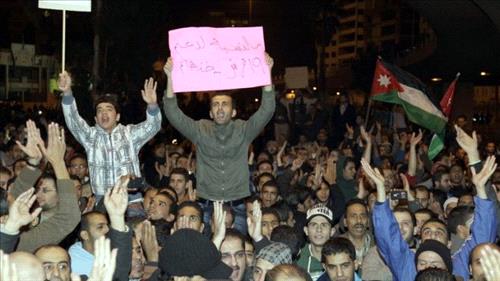Ammon News - By Musa Hattar (AFP)
AMMAN – Jordan plans to raise power prices after doubling taxes on cellphones to offset a large budget deficit, despite warnings that such measures will provoke a public outcry.
Grappling with little or no natural resources and an external debt of more than $23 billion, the kingdom is trying to reduce a $2 billion fiscal deficit this year and at the same time tackle cuts in Egyptian gas supplies.
Sabotage attacks on gas pipelines from Egypt the energy source for 80 percent of Jordan's electricity are costing the government at least $1 million a day, energy officials say.
In response, as it tackles paring down a $10.5-billion 2013 budget, the government in Amman intends to hike the price of electricity by 15 percent, having already doubled taxes on cellphones to 16 percent and to 24 percent on mobile telephone contracts.
"Such wrong and uncalculated steps that the government lacks a comprehensive understanding of the situation," Yusuf Mansur, chief executive officer of the Amman-based Envision Consulting Group, told AFP.
"When the government increases prices and taxes, the productivity and consumption of people will be affected and this will reduce government revenues."
Mansur, who headed Jordan's Agency for Economic Development, estimated the current inflation rate at about seven percent and this year's real economic growth at 2.6 percent.
According to the government, the inflation rate now stands at 6.5 percent, and real economic growth will come to 3.5 percent.
"People, including government employees, will resort to strikes and protests and the government will be forced to borrow more or impose more taxes. It's a vicious circle," he said.
"We are completely dependent on foreign aid and government economic policies have failed, at least in the past three years. I expect a very bad recession in the next stage."
A government decision in November to raise fuel prices, including household gas, by up to 53 percent, sparked a wave of nationwide protests, with some calling for King Abdullah II to step down, which is punishable by imprisonment.
"When the government increases taxes and prices, citizens will wonder 'Why are we paying that much and what for?' They are already complaining about bad government services," Jawad Anani, president of Jordan's Economic and Social Council, told AFP.
"Jordan needs to cut spending to help solve its financial problems. All countries around the world face financial crises and they deal with it through fiscal discipline. Jordan is no exception."
Anani expected inflation rate to reach 8.2 percent by the end of this year.
"It's a high rate. The government needs to be transparent with citizens about economic issues. Jordan needs clear plans and policies to address these problems, including energy, poverty and unemployment," he said, warning that "otherwise people will hold more strikes and protests".
Unemployment stands at about 14 percent in the country of 6.8 million people where 70 percent of the population is under 30, but other estimates put the jobless figure at between 22 and 30 percent. The minimum wage is $211 (159 euros) a month.
Last month, ratings agency Moody's cut its sovereign grade for Jordan from "B1" from "Ba2," in the middle of its category for "speculative" or so-called junk debt, saying government finances had weakened sharply in the past two years.
And in May, Standard & Poor's lowered Jordan's long-term credit rating by one notch to "BB-" with a negative outlook due in part to the conflict in neighbouring Syria.
Jordan is home to more than 500,000 Syrian refugees, and Amman has repeatedly complained they are burdening the country's scarce resources, while calling for international aid.
"Regional instability, including the disruptions in Egypt's gas supplies and the Syrian refugees, is seriously affecting the budget," lawmaker Muwaffaq Dmur, head of parliament's finance committee, told AFP.
In April, the International Monetary Fund released $385 million to Jordan, part of a $2.1 billion loan to help it weather regional instability.
"The government is being forced to increase prices and taxes to help save the economy and avoid bigger problems," Dmur said.
But MP Khalil Attieh, first deputy house speaker, disagreed.
"It's unacceptable to raise taxes and prices of electricity, at least not at the same time," said the outspoken independent.
"This means the government is just after people's pockets. I don't think people will accept that and remain silent."
